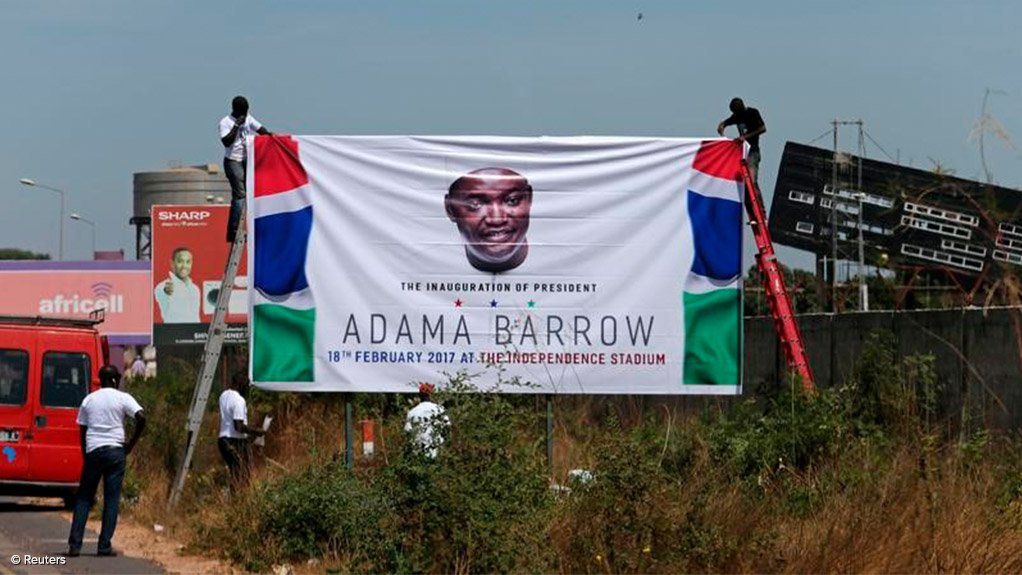![]() As the new Gambian President Adama Barrow settles in, regional organisations are being lauded for playing a key role in ensuring a democratic and peaceful transition.
As the new Gambian President Adama Barrow settles in, regional organisations are being lauded for playing a key role in ensuring a democratic and peaceful transition.
The Economic Community of West African States (Ecowas) and the African Union (AU), in coalition with external actors such as the European Union (EU) have indeed been essential in making sure that his predecessor Yahya Jammeh stepped down after losing the elections. But caution is warranted in assuming this heralds regional organisations fostering a continental trend of ending dictatorships.
Ecowas and the AU were keen to condemn Jammeh’s refusal to relinquish power after losing the presidential elections in December 2016. They even openly threatened military action in the country to remove him.
The reasons for such assertiveness, which is unusual given the many undemocratic moves in Africa, are manifold. Regional organisations on the continent are still predominantly governed by summits of heads of state. Jammeh was not able to count on key allies that would shield him from the military actions of his country’s neighbours.
In addition, the small and impoverished country’s army of less than 1 000 soldiers would not have been able to resist a concerted regional intervention. Finally, regional organisations have a strong preference for stability. Governments in power are often perceived as guaranteeing such stability whereas contenders risk producing upheaval.
But in this particular case Jammeh was considered a source of fragility for the entire region. In other words, The Gambia provided favourable conditions for Ecowas and the AU to flex their muscles. Cautious optimism should be the order of the day before assuming this resolve will be repeated elsewhere when needed.
What sets the African Union apart
Unlike some other regional organisations, such as the EU or the Common Market of the Southern Cone of South America (Mercosur), democracy is not a precondition for membership in the AU. The AU’s membership comprises the whole gamut of regime types. These include democracies, absolute monarchies, authoritarian regimes and dictatorships.
Numerous heads of states on the continent have been in power for 20 or more years. It’s not surprising that no country needs to fear being suspended from the continental organisation because of its domestic political system.
Nevertheless, the AU has tried to foster democratic standards and frowns on unconstitutional changes of government. These are broadly understood as the forceful replacement of a democratically elected government. But this constellation requires free and fair elections in the first place. This fixation on constitutional change exempts countries where political power is governed by non-democratic constitutions or political practices.
The AU seems to be increasingly willing to interpret its mandate in broader terms when the conditions are favourable. But in many countries with massive democratic deficits the AU can be expected to continue a policy of waving through elections that are not free or fair. Governments that oppress democratic movements include the AU’s host country Ethiopia or Jammeh’s new home Equatorial Guinea.
The role of Europe
The EU and its member states have also played a supportive role in increasing the pressure on Jammeh and slimming down his chances of staying in power. Whether we can see this pattern reproducing elsewhere remains questionable. This is because Europe’s current dominant interest in Africa doesn’t always favour regime change.
With more European governments succumbing to populist demands, cooperation with Africa is increasingly framed around reducing the number of refugees crossing the Mediterranean. The Gambia is home to less than two million people. Yet, it accounts for around 5% of African refugees getting on a boat to Europe. Many of these people were fleeing Jammeh’s despotic rule. The post-election turmoil further fuelled this exodus.
Barrow’s return and a successful transition to democracy is a favourable outcome for Europe.
But the situation may be different in African countries where dictators are not perceived as a reason for emigration to Europe but rather seem effective in oppressing the movement of people. Here, the EU and its member states might be less likely to play an assertive role in supporting democratic overthrows.
The main driver of political change: the people
Intergovernmental organisations, be they African or external, cannot be expected to always be the saviours of democracy. The good news is that it might be enough if they play second fiddle. There has been a lot of attention on the role of Ecowas and the AU in supporting the transition in The Gambia. We easily forget who remains the main driver for political change. It’s the Gambians who overcame their fears and reclaimed their dignity by ousting a dictator. If Barrow doesn’t live up to expectations of democracy, he too is likely to face popular resistance.
In many other countries the established networks of patronage and the oppression of opposition voices are still firmly in place. Six years after the Arab Spring a political coming-of-age of the sub-Saharan African youth is not yet within grasp but events such as those in The Gambia can bring the continent closer to democracy, one transition at a time. In some cases, regional organisations might be allies from the start and in other cases they will have to be won over.
Written by Frank Mattheis, Senior Researcher in Global Studies, University of Pretoria
This article was originally published on The Conversation. Read the original article.
EMAIL THIS ARTICLE SAVE THIS ARTICLE ARTICLE ENQUIRY
To subscribe email subscriptions@creamermedia.co.za or click here
To advertise email advertising@creamermedia.co.za or click here











